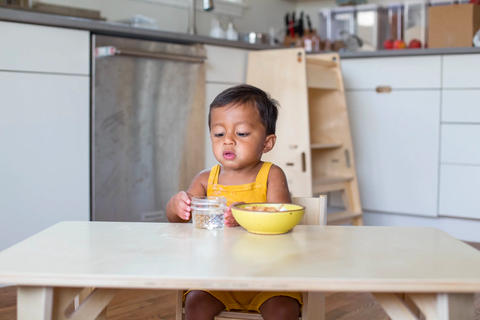The Montessori Method is an educational philosophy developed by Maria Montessori, an Italian physician and educator who left behind a legacy of her dedication to childhood education. It continues to inspire parents and educators around the world - including us here at Sprout!
What is Montessori?
The Montessori Method encourages self-guided, hands-on learning and independence, even for the youngest children. It is based on the belief that children are naturally curious, capable, and eager to learn. The freedom offered through this type of self-guided play is not a free-for-all! In fact, through the Montessori Method, everything is carefully considered and prepared by the adult. Play can be guided by what you have available and ready for your child.
“… the child’s individual liberty must be so guided that through his activity he may arrive at independence … the child who does not do, does not know how to do.” —Maria Montessori
The Prepared Environment
A phrase often heard when discussing the Montessori Method is a "Prepared Environment." An environment can be designed to encourage learning and offer accessibility for the child, maximizing opportunities for independence and concentration. Once your child develops trust in their own abilities, they will continue to progress and seek out what else they can accomplish. This inspires a life-long love of doing and learning!

Children learn naturally in an environment where they have access to the right tools. Through careful observation of your child, you can prepare the environment specifically to their needs. This can include low shelves, a small table and chairs, easy access to clothing, and more. This environment can offer the right tools without overwhelming your child with options.
“Education is a natural process carried out by the human individual, and is acquired not by listening to words, but by experiences in the environment.”—Maria Montessori
Practical Life Skills
The environment can encourage that a child's activities are purposeful ones, where they learn practical skills. What are practical skills? They are skills involved in everyday tasks that get repeated. By learning tactile manipulation, pouring, stacking and more, children can master the control for necessary skills. They can also build confidence as they participate more and more in their community at home and at school.
Some of these practical skills are related to caring for oneself, such as getting dressed and washing hands. Others emphasize caring for the environment by watering plants or setting a table. These skills help develop concentration, confidence, responsibility, coordination, and independence.
“The exercises of Practical Life are formative activities, a work of adaptation to the environment. Such adaptation to the environment and efficient functioning therein is the very essence of a useful education.”—Maria Montessori
Treating Every Child as an Individual
Another key focus of Montessori is the lack of comparison to other children. There is no "right timing," other than whatever timing is right for each individual child! Every child is different, which means there is no right or wrong when it comes to how they learn and progress.
By providing your child with opportunities to be independent, you can allow them to explore their surroundings and educate themselves at their own interest level and pace.

Clark, the owner of Sprout, had this to say about making Montessori-inspired products:
“Our goal with developing Montessori furniture is to help parents create spaces that lead to creative independence and confidence by making beautiful pieces that work in the home, daycare, and school, no matter if you practice Montessori methods or are just looking for safe and sturdy wood furniture for your family.”
For more information about Montessori education, as well as other early childhood educational philosophies, visit our pedagogical comparison page!



